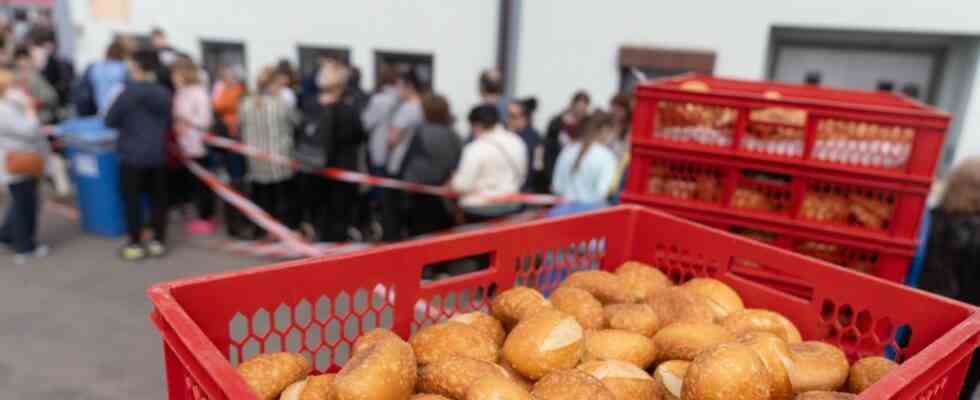Peter Zille’s cell phone has been ringing almost continuously since Tuesday. On that day, the Bavarian cabinet announced that it would increase funding for the food banks in the coming year from 600,000 euros to one million euros from the hardship fund. Since then, everyone has wanted to know whether this amount is sufficient at all. Or where the money should go. “But we can’t answer that seriously, because we were surprised by the increase ourselves. And first we have to evaluate where it’s most beneficial,” says Peter Zilles, the chairman of the boards in Bavaria.
The Bavarian food banks and their mostly volunteer helpers are going through the toughest times in many years. Russia’s ongoing attack on Ukraine, rising energy prices and high inflation are bringing the food banks ever closer to collapse. Several institutions have already been forced to turn away people in need this year.
Of course, according to Zilles, part of the money should go directly to the local food banks. But the office and logistics will also urgently need to be expanded. In the medium term, the association and its 174 food banks in Bavaria must continue to professionalize and expand in order to be able to provide more and more people with food. According to slightly older figures, the Tafel take care of 200,000 people in Bavaria. In the meantime, however, the number is likely to be much higher, and new data is to be collected at the beginning of next year.
Money is needed, for example, in administration. “A permanent employee was tied up for several months just for a larger donation and the receipts to be issued,” says Tafel boss Peter Zilles. In addition, the state association only has one large truck to distribute food in Bavaria. However, it is essential to position oneself more broadly here. Because: “Supermarkets are getting better and better at their orders,” says Zilles. And the better they got, the less food was left for the Tafel. This means that the food banks now have to drive to the producers themselves more and more often in order to distribute food from there to central warehouses and then to all corners of Bavaria.
And then there are the rising energy prices. Zilles assumes that energy costs will increase eightfold. Given the number of challenges that the panels already have to deal with, it will only be possible to deal with them next year. Then when the bills actually landed in the mailboxes. However, Zilles fears a “serious blow to the neck” in the first half of 2023.
“We see more and more locals who need help”
Edeltraud Rager, the boss of the table in Nuremberg, sees it similarly. Since the number of customers there doubled this year and continues to grow, the situation has become extremely tense. “It’s no longer just refugees from Ukraine who come to us. We’re seeing more and more locals who need help,” says Rager. In addition to students whose student loans are simply not enough, there are also many individuals and families. Six months ago, many of them could not have imagined having to go to the Tafel. For Rager and her around 280 volunteers, this means that they now hand out food several times a day. And having to ration food again and again.
In her opinion, one of the reasons for this is the extremely high energy costs that people have to pay. A problem that also affects the Nürnberger Tafel itself and its five branch offices. With seven refrigerated trucks, they distribute groceries from the warehouse in the city area. To do this, a car needs a full tank of diesel per week. “That costs around 130 euros per filling,” Rager knows. A year ago the amount was half that. In addition, just for the warehouse and the central issuing office in Nuremberg, there is a rent of 7500 euros per month – without additional costs. And these are just a few of the regular posts. For an organization that is largely financed by donations and supported by volunteers, this is a Herculean task. Of course, one is very grateful for the increase in the subsidy, say Rager and Peter Zilles in unison. But without the many other donations and helpers, many people would probably have to starve first.
According to Rager, it is currently private companies in particular that are saving the panels from collapsing and relieving other helpers. “More and more often, employees are released from their companies so that they can help us for a day or two. Without them, nothing would work for us,” says Edeltraud Rager. Nevertheless, we are very happy about every additional helper.

